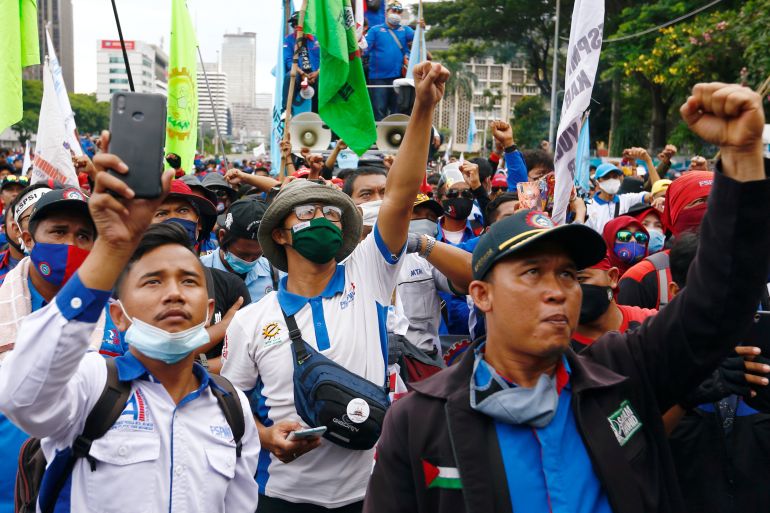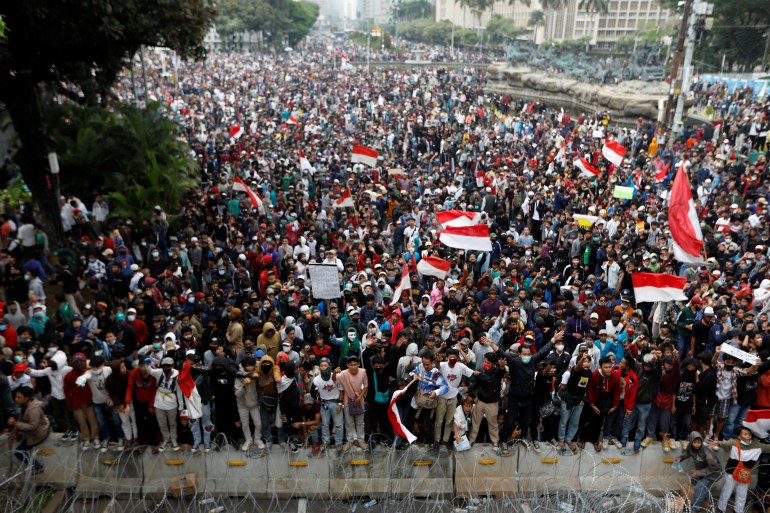Indonesia slumps into first recession since 1998 Asian crisis
The government says its economy is showing signs of improvement, but analysts say they see more weakness over the coming months.

Indonesia fell into recession for the first time in more than 20 years in the third quarter as the COVID-19 pandemic battered consumption and business activity in Southeast Asia’s largest economy, official data showed on Thursday.
Gross domestic product (GDP) shrank 3.49 percent on an annual basis in the July-September period, data from the statistics bureau showed, slightly more than the 3 percent contraction expected in a Reuters poll. The economy contracted 5.32 percent year-on-year in the second quarter.
Keep reading
list of 4 itemsArea burned in Indonesia fires ‘greater than the Netherlands’
Palm oil peril: Is your peanut butter putting primates at risk?
US looking for ‘new ways’ to cooperate with Indonesia
Indonesia’s first recession since the Asian financial crisis in 1998 – normally defined as two consecutive quarters of economic contraction – came as the country struggled to contain the coronavirus outbreak.
Authorities in Indonesia, which has the highest COVID-19 cases and death toll in Southeast Asia, expect about 3.5 million people to lose their jobs this year, with the government and the central bank both taking action to try to soften the blow.
Statistics bureau chief Suhariyanto said despite the annual contraction, the economy showed improvement in the third quarter from the previous three months in all sectors.
“The recovery should continue over the coming months, but it is likely to be slow and fitful,” Gareth Leather, senior Asia economist at research firm Capital Economics, said in a research note sent to Al Jazeera.
“While Indonesia is a long way from bringing the coronavirus under control, the number of new cases does appear to be easing. This will allow social-distancing measures to be relaxed,” Leather added.
Labour law
President Joko Widodo has ordered government ministers to accelerate budget spending for the rest of the year and start planning project procurements to expedite spending early in 2021.

The president recently signed a controversial law that aims to attract investment and create jobs, but labour unions are challenging the law at the Constitutional Court and have led to large, and at times violent, protests in recent weeks.
The government has cut its economic forecasts several times and now expects GDP to contract between 0.6 percent and 1.7 percent for the full year. The tightening of social restrictions in Jakarta amid a fresh surge in virus cases has slowed the recovery.
Domestic demand, the mainstay of Indonesia’s economy, has yet to revive, with core inflation continuing to weaken since March.
![Indonesia inflation chart [Bloomberg]](/wp-content/uploads/2020/11/365766562.jpg?w=770&resize=770%2C433)
The country has recorded trade surpluses in recent months as exports improve, but a recent purchasing managers’ survey showed manufacturing continues to struggle.
On a quarterly, non-seasonally adjusted basis, GDP grew 5.05 percent in the June-September period but that was also slightly below expectations for 5.34 percent rise in the Reuters poll.
“Given the weak momentum from Q3, the GDP for [the fourth quarter] is at risk as well and we are more likely now than before to see growth still at significant negative print of around -2 percent in Q4, which would push the full year GDP to -2 percent,” said Wellian Wiranto, an economist with OCBC.
The government has pledged to accelerate spending to push GDP back into growth this quarter, while Bank Indonesia Governor Perry Warjiyo has said the central bank has further room to act after aggressively cutting interest rates and more than $30bn of government bond purchases.